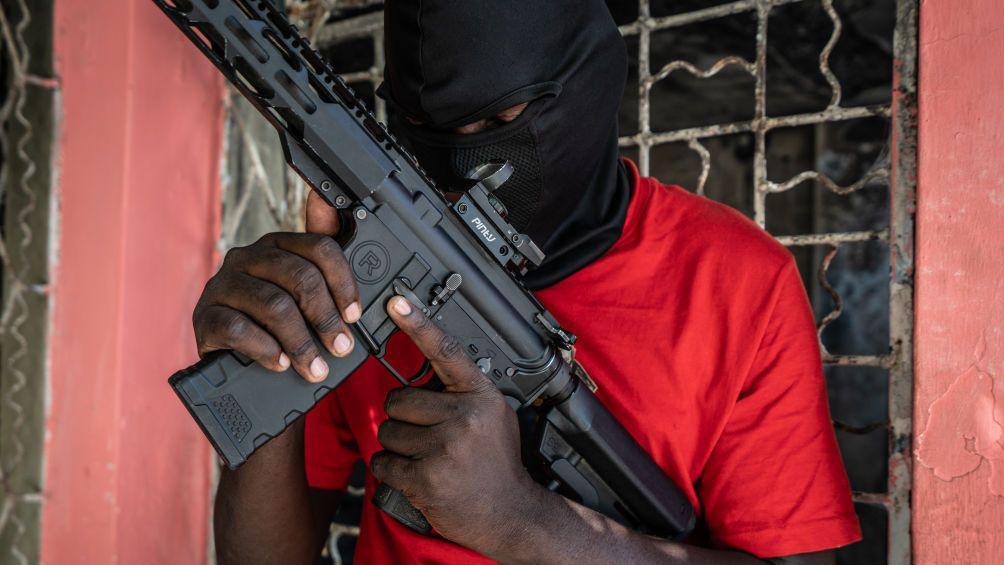Haiti is a State out of control. More than two weeks after the country’s prime minister resigned following violence in the capital, Port-au-Prince, it is still unknown what the transitional presidential council will look like.
One of the challenges that this organization will have to face is illegal arms trafficking, which has strengthened the gangs.
The escalation of violence since mafia groups took power has caused an exodus from the capital.
Among those leaving is David Charles, a 14-year-old teenager whose father, named Israel, is nervously awaiting his arrival in Cap-Haitien.

The escape from Port-au-Prince
A bus with covered windows pulls to the side of the road and Israel smiles in anticipation. His son David comes down the stairs with the luggage and they both hug each other tightly.
David managed to escape Port-au-Prince, a city torn by armed gang violence and political chaos.

Most of the violence plaguing Haiti is concentrated in the capital, which the UN estimates is 80% controlled by gangs.
Israel did not want his son, who had lived there alone for two years to complete his education, to become “a victim.”
This month’s wave of violence prompted him to send his son to Cap Haitien, a safer city in the north of the country.
“The trip was very long, more than six hours. “I was praying the whole way,” says David. And he adds: “later, the bus driver told us that there were a lot of shots in one area, but they did not hit our vehicle.”
Other passengers on the bus seem exhausted, relieved, but also angry. A man in a dark T-shirt and sunglasses responds in a low voice when we ask how he is, and shows visible anger when he tells us that he has a message for the United States.
“Here all the weapons are from the United States, everyone knows it. If the US wants to stop this, they could easily do it in a month! We ask the US to give us the opportunity to live, just to give us a chance,” she explains.
How weapons arrive from the US
Although no weapons are manufactured in Haiti, a UN report in January revealed that all types of weapons are flooding Port-au-Prince, from 9mm pistols to assault rifles such as AK47s, sniper rifles and machine guns.
All of these weapons fuel the shocking rise in gang-related violence in Haiti. There is no exact figure for how many firearms are trafficked in Haiti today.
A UN report estimated that in 2020, there were an estimated half a million legal and illegal weapons in the country.
The document specified that weapons and ammunition were being smuggled by land, air and sea from US states such as Florida, Texas and Georgia.
Seizures have occurred in the country’s main ports: Port-au-Prince, Port-de-Paix and Cap Haitien.

Illegal weapons are often hidden in shipping containers among donations of toys and clothing.
In July 2022, Haitian authorities seized a huge shipment of dozens of firearms and 15,000 cartridges in a shipment from Florida destined for an Episcopal church in Haiti.
The UN also identified the use of several clandestine landing strips built for humanitarian purposes after the devastating 2010 earthquake, which are now barely guarded.
“We are not playing”
In a corner of his office, Cap-Haïtien’s chief prosecutor, Charles-Edward Durant, keeps a semi-automatic weapon.
He assures that he needs security every time he travels and that things have never been so bad in Haiti: “this is a nightmare, a horrible dream. “I would like Haitians to wake up and work to have a better country.”
Are you concerned that, as guns proliferate widely, violence could reach Cap-Haïtien?
At this question, he smiles with more confidence. “We are resisting, we have our ways: informants, checkpoints… Are they afraid of us? Of course. We are not playing. Anything can happen. “If a gangster comes, he doesn’t come to play, but neither do we.”
What the US is doing about it
The United States, for its part, promised to address the problem of guns and gangs. Last year, the State Department said it planned to help establish a new police unit in Haiti to address arms trafficking into the country.
Deputy Assistant Secretary of State for Caribbean and Haiti Affairs Barbara Feinstein alleged at the time that arms trafficking from the United States was only “one part of the equation” in the Haiti problem.
However, with no head of state and effectively no government, people living in the Caribbean country are trapped in a vicious cycle of violence fueled by illegal weapons. One of them is Juliette Dorson, 50, who fled Port-au-Prince after surviving a shooting.

This woman, whose profession is an event organizer, still bears the scars of the bullets that hit her when she was ambushed while working.
“I said, ‘Run, run, run because they’re shooting.’ At that moment they shot me twice: once in the feet and once in the arm.” Ten people died, including Luc, his 22-year-old business partner.
Juliette sobs when she talks about him, as the memory of the event is too traumatic.
“When the gangs and violence started in Port-au-Prince, the government did nothing to stop it and they let it grow and grow. Now it is too complicated to stop it,” she laments.
*Additional reporting by Morgan Gisholt Minard.

Click here to read more stories from BBC News World
Remember that you can receive notifications from BBC Mundo. Download the new version of our app and activate them so you don’t miss our best content.
- Do you already know our YouTube channel? Subscribe!
- “The problems we see in Haiti have been perpetuated by international organizations”
- “We will not stop deportations to Haiti nor will we authorize refugee camps”: Luis Abinader, president of the Dominican Republic
- 5 factors that explain the historical roots of the permanent crisis affecting Haiti
